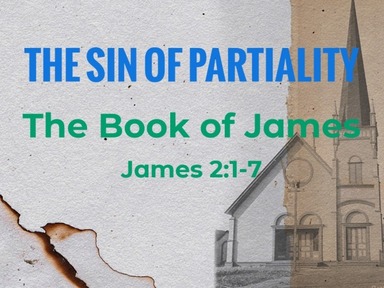The Sin of Partiality

The Problem
God is neither partial nor prejudiced in His dealings with the human race. The color of a person’s skin, the size of his bank balance, the number of degrees he has after his name, or the place he holds in the social hierarchy leaves God completely unimpressed. The Lord Jesus was as polite to the woman at the well (John 4) as He was to Nicodemus (John 5). He was as gracious to the woman who touched the hem of His garment as He was to Jairus, the ruler of the synagogue. He was as open to poor, blind Bartimaeus as He was to the rich young ruler. He had no “respect of persons.” He was as honest and forthright with the Syro-Phoenician woman as He was with Pilate. He treated everyone with the same love, the same interest, and the same care and concern. He was not condescending when He was dealing with the publicans and sinners, and He was not cowed or compromising when He was dealing with those who occupied the seat of power. He gave the outcasts and the untouchables the same gentle, loving compassion that He extended to the scribes and the Pharisees. Sometimes the Lord did not approve of peoples’ behavior, but He looked beyond that to the individuals and their deepest needs and treated them with dignity no matter what.
The Illustration
Some years ago, I met a woman who liked to put this kind of behavior to the test. She would select a fashionable church and put on old, ill-fitting clothes, shabby shoes, and a dowdy hat. She would arrange her hair in an unsightly bun and present herself at the church. Her main interest was in finding out what kind of treatment she would receive at the door, either upon arrival or at the end of the service. Usually, little or no attention was paid to her at all. No one cared if she came or went. Usually, she received a perfunctory handshake at the door; the preachers eyes being busy elsewhere.
The next Sunday, she would present herself at the same church in a different guise, with styled hair, and wearing an expensive suit with a mink fur stole and expensive jewelry. On the way out, the pastor would be effusive.
“We’re so glad to have you with us. This must be your first visit. We do hope you’ll come back. What is your name?”
She would look at him. “Oh, no, this is not my first visit. I was here last Sunday. As a matter of fact, you shook hands with me at the door then too.”
“Surely not!”
“Oh yes. But, you see, last Sunday I dressed in old clothes, and you really didn’t see me at all. You said a perfunctory, ‘Good morning.’ Then you hurried on to the lady behind me, who was much more stylishly dressed than I was. And, no, I shall not be back.”
The Lesson
After C. S. Lewis became a Christian, he decided that it would be appropriate for him to join a local church. There he found himself in the company of that very collection of his neighbors he had formerly sought diligently to avoid. The local grocer came sidling up to him to unctuously present him with a hymnbook. He looked around him and noticed that the man over there had boots that squeaked, the woman in front of him was wearing a ridiculous hat, and the man behind him sang off-key. He found himself drawing the unwarranted conclusion that these peoples’ faith must somehow be ridiculous. Only later did he learn that some of these people were, in fact, devout, well-taught, and valiant Christians—believers whom Satan himself had reason to fear. It is a great mistake to judge people by their appearance.